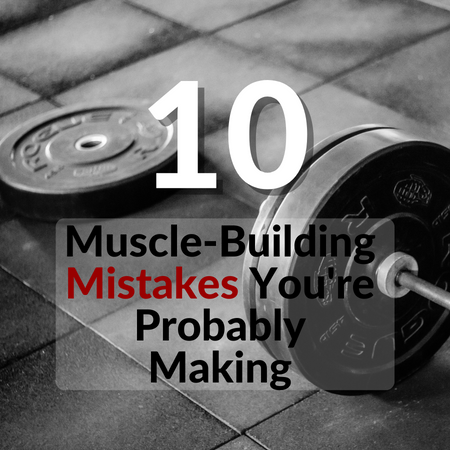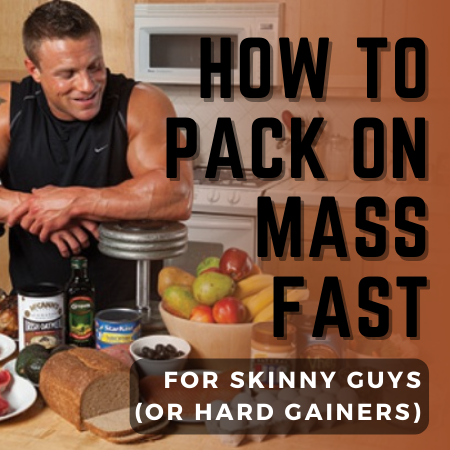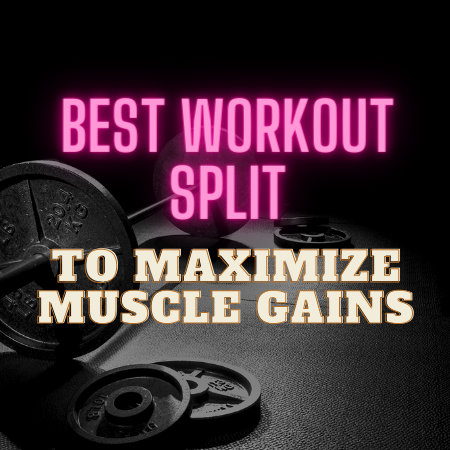
10 Muscle Building Mistakes You’re Probably Making
Everyone wants to build muscle.
Building muscle not only gives you a more aesthetically pleasing look, it also improves your overall health. Studies have shown that increased muscle mass is linked to reduced risks of hypertension, metabolic syndrome and cardiovascular diseases, among others. In addition, with increased muscle mass, you will have increased metabolism, stronger joints and tendons, improved posture and balance, and stronger bones. Furthermore, more muscle means more strength, which will help in Activities of Daily Living (ADL). And the list goes on.
However, building muscle is a challenging task for many. This is because of the misconception that you can get to the physique you want by simply going to the gym and lifting weights. Unfortunately, there is much more to effective muscle building than that. If you struggle with muscle building, make sure you’re not making any of these mistakes!

6 Tips on Staying Motivated
You know exercise and nutrition are good for you. It controls your weight, reduces risks of diseases, and improves your mental health and mood.
Doing it though, is another thing. In particular, overcoming the inertia to get started can be a huge first step.
But sticking to a workout and nutrition program is even harder. It takes deep, lasting, dedication, consistency and motivation. That’s why more than a third of the world’s population is overweight.
Furthermore, many think that exercise and nutrition have to be torturous, time-consuming and/or exhausting, therefore avoiding it.
Not having the right motivation coupled with the negative views of exercise and nutrition have caused millions of people to start a program only to quit halfway.
In this article, I’ll be sharing on some tips that can help you to stay motivated.

Training Pyramid of Importance
“What’s the best chest workout? Are squats better than lunges?”
Are these some questions you grapple with? You’re not alone

How Often Should You Train to Maximize Muscle Growth?
We all want to maximize our muscle growth in the shortest possible time. But we also know that if we train too often, the fatigue and soreness that kick in will not allow our body to recover in time. And this will mean muscle growth isn’t maximized in the long term.
So how do we know what’s the optimal number of times to train per week, assuming that you have the time for it? The short answer is that it depends on the individual, like any other training or nutrition recommendation that I give. The long answer? Read on to find out more! We will be looking at what an optimal frequency of training looks like, tradeoffs of higher and lower frequency, and how to reduce or increase your frequency and how to know if that works for you.

How to combine Cardio into your Lifting Routine
If you’ve been following me for a while, you’ll probably know I always emphasize the importance of lifting weights. It is not the only way to gain muscle, it also helps you to lose weight sustainably through increased metabolism, reduce injuries, diseases, illnesses, improve posture, balance, and sleep, and gives you stronger bones for longevity, to name a few. On the other hand, cardio has its great benefits as well - it burns calories, help in cardiovascular health, improves mood, and has also shown to be highly correlated to reduced diseases and illnesses too.
So this article is not to compare which one is better, because they are used for different goals, but how do we best combine the two. But first, we will look at how they’re different, the tradeoffs, and finally what types of cardio, how much cardio, and when to do them to help with your goals. Let’s dive in.

How to Choose the BEST Exercise for Muscle Growth
You’ve probably seen tons of videos or blog posts on the Internet entitled “The best arms exercise!” or “The only glute exercise you’ll ever need!” And I’m sure other videos titles like “You should never do this exercise” have caught your attention before, especially if it has more than a million views. I’m guessing you’ve watched them and took their advice as golden. I do use such headliners myself on my YouTube page, but that’s all for marketing and click bait purposes. The truth is, there is no such thing as a best or worst exercise for muscle growth. There might be a grain of truth in that, but it is mostly BS - the best exercise for arms or glutes does not exist! Does that mean that the fitness influencers are wrong?
In this article (adapted from concepts by Dr. Mike), I will be giving a checklist to assess if an exercise is not good for you or not. Then you can judge for yourself if these fitness influencers are wrong. Let’s dive in.

4 Must-Dos to Ensure Optimal Muscle Growth
Everyone wants to build muscle as fast as possible. In fact, one of the top reasons why people come to me for Personal Training is to build muscle. However, the truth is that muscle-building is a long, slow and often frustrating process. As a result, it may be hard to tell if you’re actually effectively building muscle or not. And the added fact that progress will slow down as you gain more experience, is not helping.
But roughly how fast can you realistically build muscle? A study at McMaster University found that the average male beginner training 4 times a week can gain about 3kg of muscle in 10-12 weeks. That means about 1kg of muscle per month while training in optimal conditions. In this other study, it was found that with good nutrition and consistent training, 0.9kg of muscle growth per month is possible for beginners. While it may seem little, over time, the results can be significant. With 12 months of consistent training, you’ll be able to gain up to 10kg of muscle mass! But as you progress, the rate of muscle gain will slow down. At the intermediate stage, researcher Alan Aragon estimate the rate of muscle growth for a 70kg male is about 0.4-0.8kg per month. And for advanced individuals, about 0.2-0.4kg of muscle growth per month.
And these numbers are assuming that your training and nutrition are optimal, but since this does not happen for most people, muscle-building can actually be even slower than previously outlined. So the important question is - What should you do to build muscle as fast as possible? In this article, check out the 4 Must-Dos to ensure optimal muscle growth.

How to Pack on Mass Fast for Skinny Guys (or Hard Gainers)
You’ve been training for some time, eating all the ‘bodybuilding food’, and on paper, it seems like you’re doing everything right. But you just can’t seem to put on any size despite all the hard work, and get frustrated. You look at yourself in the mirror daily and feel like you’re just destined to be skinny forever, or in other words, a hard gainer.
I’ve come across many people who once thought they were hard gainers. No matter how much they ate or trained, they just can’t seem to put on any weight onto their skinny frame. Although there are studies that show that body types are not pseudoscience, it is still definitely possible for hard gainers to put on significant muscle mass as long as they are eating and training right. And after these hard gainers realized their mistakes and optimized their training and nutrition, they started to add pounds of muscle to their frame after consistency and patience.
I am pretty sure most of you hard gainers can do the same too. And in this article, I’ll be going through the things skinny guys should be doing to put on muscle mass in the most efficient way possible. Let’s dive in.

Best Science-Based Workout Split to Maximize Muscle Gains
One of the biggest decisions you have to make when you start hitting the gym is choosing which workout split to do. Or to put it simply, what exercises to do on different workout days of the week. For example, when I first started to gym, I used what was very popular in fitness magazines, and what my friends recommend - the “Bro Split”, meaning to do each muscle group once a week (Monday is International Chest Day!). I definitely build a significant amount of muscle over years of training, but the more important question is whether I would have progressed faster if I had used a better workout split.
After years of lifting and research, I would say that there’s a high chance that using a different workout split would have accelerated my muscle growth. Finding a workout split is also a useful way to formulate a training plan and stick to it - an essential step to optimizing results. You wouldn’t want to walk into a gym finding the first empty machine and start pumping out reps would you?
In this article, we will take a look at the different options and which one is best suited for you. Let’s dive in.
